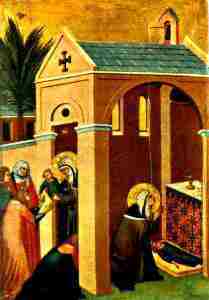St. Lea was a fourth-century widow who abandoned her wealth and entered consecrated life, where she lived a very holy life of asceticism and prayer.
Her contemporary, St. Jerome, wrote a brief description of her life after she died — this is the only source of information on her. Jerome is best known for his Vulgate translation of the Bible, but in 384, he wrote a letter to his spiritual director Marcella, another woman in Rome who left her wealth to join consecrated life after the death of her husband.
This letter makes it clear that Lea was a mutual friend to Jerome and Marcella. He writes, “Who can sufficiently eulogize our dear Lea’s mode of living? So complete was her conversion to the Lord that, becoming the head of a monastery, she showed herself a true mother to the virgins in it, wore coarse sackcloth instead of soft raiment, passed sleepless nights in prayer, and instructed her companions even more than example than by precept.”
Jerome says that Lea is “welcomed into the choirs of the angels; she is comforted in Abraham’s bosom.” He urges Marcella to remember the lesson of her life: “We must not allow…money to weigh us down, or lean upon the staff of worldly power. We must not seek to possess both Christ and the world.”
Start your day with Always Forward, our award-winning e-newsletter. Get this smart, handpicked selection of the day’s top news, analysis, and opinion, delivered to your inbox. Sign up absolutely free today!

